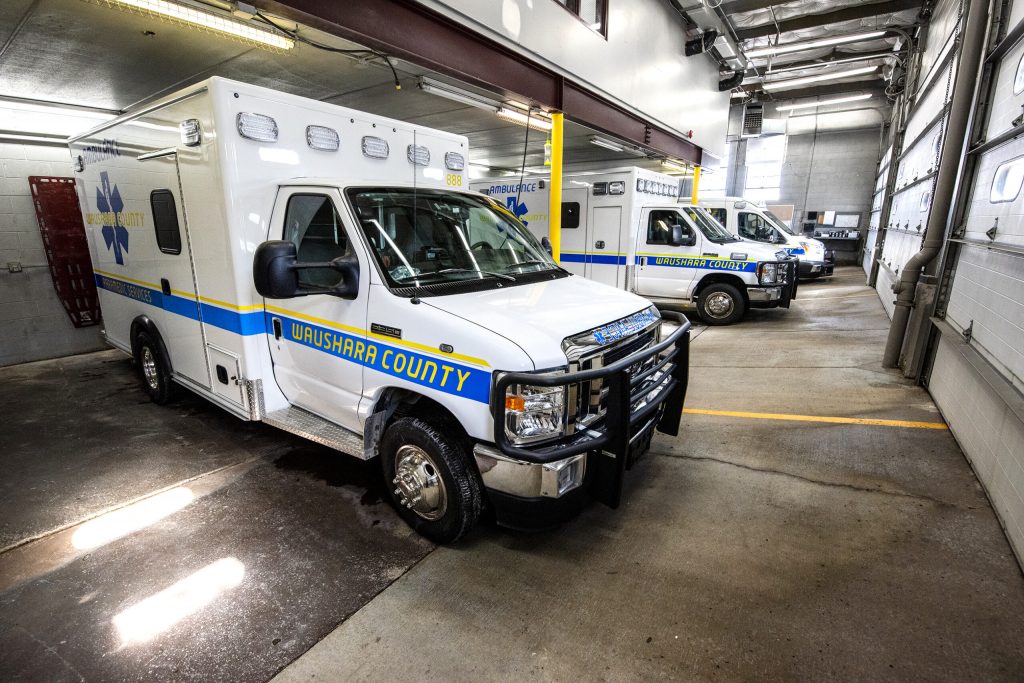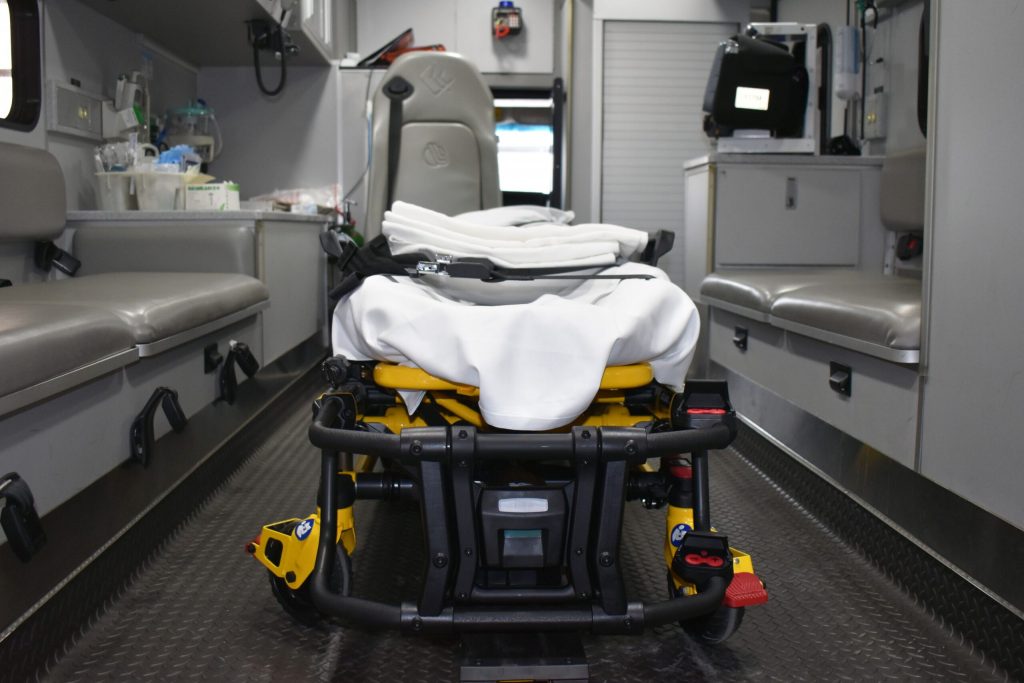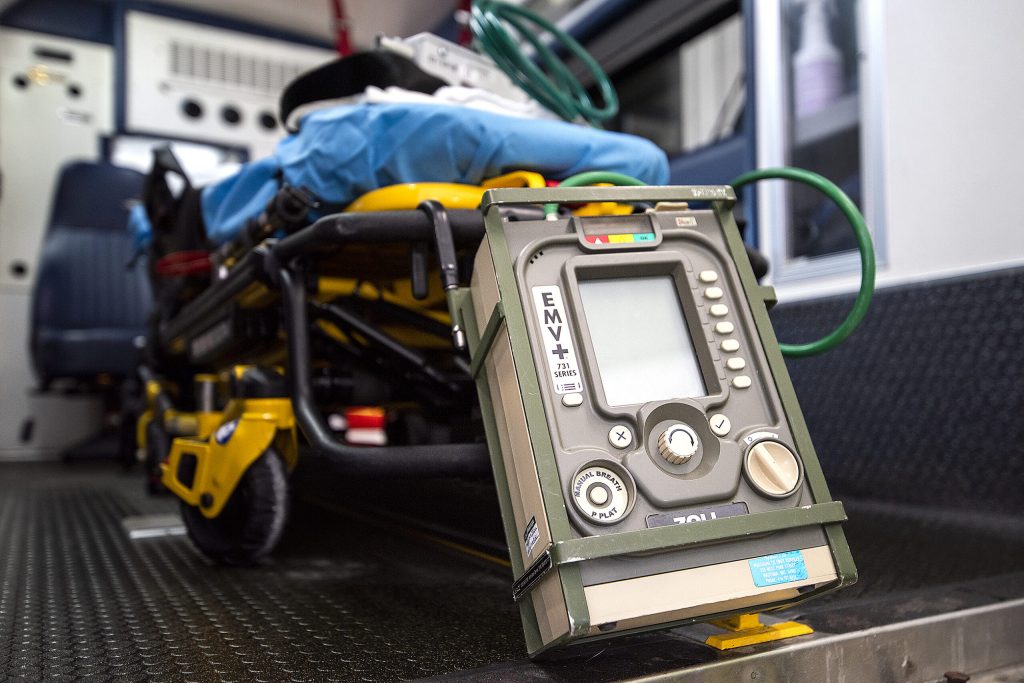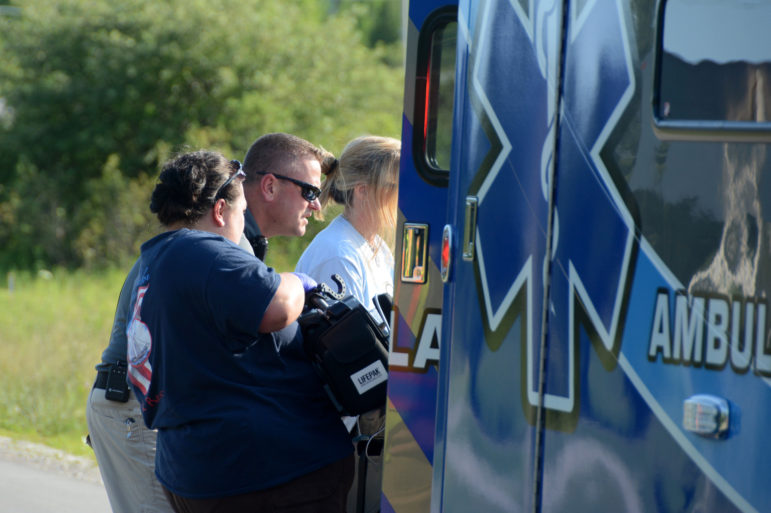Bill Allows 17-Year-Olds to Provide Emergency Medical Services
Proposal aims to address staffing shortages, but some EMS groups oppose it.

GOP lawmakers want to allow 17-year-olds to get licensed or certified as EMS professionals to address staffing challenges. Angela Major/WPR
Seventeen-year-olds would be able to provide emergency medical services as part of ambulance crews under a bill proposed by GOP lawmakers in the Wisconsin Assembly.
The proposal would allow 17-year-olds to apply for a first responder certification or emergency medical technician license at various skill levels, including a paramedic. Current law doesn’t allow that for anyone under 18.
Rep. Karen Hurd, R-Fall Creek, and Sen. Jesse James, R-Altoona, are co-authors of the legislation. Last week, the Republican-controlled Assembly health committee voted 11-5 to pass the bill along party lines.
Hurd said she introduced the bill as emergency medical services, or EMS, agencies have struggled with staffing challenges. She recalled an incident where a member of the American Legion collapsed during a funeral she attended in Fall Creek. Hurd said it took longer for the ambulance to arrive than the time it would have taken to drive him to a hospital in the nearby city of Eau Claire.
“Forty-one percent of the EMS agencies have periods (when) they don’t even have staffing to be able to respond to a request just like what happened to us,” Hurd said. “There weren’t even first responders. We have first responders here in Fall Creek, but there was no one available.”
The figures cited by Hurd come from a report released in March last year by the Wisconsin Office of Rural Health. The office surveyed EMS agencies that provide ambulance service. Of 216 agencies that responded, 41 percent reported periods of inadequate staffing over the previous 12 months. At least 78 percent of agencies said they had responded to a request for mutual aid due to a lack of staff.

Ambulances like this one pictured on Feb. 11, 2021, are outfitted with equipment that can keep people alive while rural agencies often travel long distances to get people care. But, many rural services are struggling to operate due to a shortage of staff and volunteers, long distances and inadequate financing. Danielle Kaeding/WPR
State health officials support the bill, but some EMS groups are opposed
The bill has received the support of the League of Wisconsin Municipalities, Wisconsin State Fire Chiefs Association and Wisconsin Department of Health Services.
The Wisconsin EMS Association and Professional Ambulance Association of Wisconsin oppose the legislation.
In written testimony, DHS Legislative Director H.J. Waukau said the legislation builds on nearly $40 million in COVID-19 relief that was awarded to EMS services in 2022. Gov. Tony Evers also signed a deal on shared revenue funding last year that provides new staffing flexibilities to ambulance providers and eliminates a requirement to pass a national exam.
“(The bill) would add to these new flexibilities as communities across the state evaluate how best to address staffing and workforce shortages for critically needed services,” Waukau said.
DHS provided data that shows ambulance runs have increased more than 15 percent since 2019 to 921,546 runs last year. At the same time, agency figures show the number of EMS professionals has dropped about 4 percent in the last five years to roughly 17,072 licensed staff.
However, Alan DeYoung with the Wisconsin EMS Association said that doesn’t tell the whole story. He said around 3,000 to 3,500 licensed individuals no longer work for an EMS agency. A DHS spokesperson said the agency’s data does include individuals who aren’t affiliated with EMS departments, but she couldn’t confirm the association’s figures.
DeYoung, the association’s executive director, said he would rather see an effort to bring those professionals back through increased funding. While investments in grants and shared revenue have helped, he said it’s unlikely to resolve staffing challenges. He estimated it may cost around $500 million to adequately fund EMS agencies to bolster staff.
DeYoung said the bill raises questions about the quality of care that patients may receive since Wisconsin only requires two people to staff an ambulance.
“You could have somebody that just turned 18 that is one staff member, and now you have a licensed 17-year-old that also counts as your two staff member-requirement,” DeYoung said. “They could both be very inexperienced. With the staffing shortage we have, that is one of the realities.”

A critical care ventilator with advanced capabilities is kept in some Waushara County EMS ambulances. Angela Major/WPR
The bill requires parental consent, compliance with child labor laws
The bill requires eligible minors to meet school attendance requirements and provide a letter of consent from a parent or guardian, as well as a letter from an EMS agency endorsing the individual. They would also have to comply with state and federal regulations, including child labor laws.
DeYoung expressed concerns about the mental health and wellbeing of a 17-year-old serving in such a role. The association cited federal data that estimates 30 percent of first responders have behavioral health issues, including depression and post-traumatic stress disorder.
Rep. Lisa Subeck, D-Madison, cited similar concerns about inexperienced teens responding to care for victims of a gunshot wound when she voted against the bill during the Assembly health committee’s meeting last week.“I think there are real solutions that we should be looking to, to encourage individuals to get into the field, to figure out how we better staff those ambulances,” Subeck said in the meeting. “I don’t think that, frankly, child labor is the answer.”
State and federal laws don’t limit the hours that minors 16 years and older may work as long as they’re meeting school attendance requirements. However, 17-year-olds would not be able to drive an ambulance.

Aaron LeClair, emergency services director for Door County, Wis., says his service is responding to calls as though there is community spread of the new coronavirus, including increased use of personal protective equipment. Here, he responds to a call in July 2019. Photo courtesy of Tad Dukehart
Minors must consult with qualified health professionals
If the legislation passes, Altoona Fire and Rescue Chief Mark Renderman said it would help his department cover calls. He said the agency has a paid full-time staff of four with around 45 volunteers, most of whom are between 18-to 22-years-old.
Renderman said he understands concerns about the maturity and experience level of some individuals, but he said minors seeking a license often want to pursue a career in emergency services.
“As an agency, we have the opportunity to weed out those that we don’t believe are going to be a right fit for this,” Renderman said. “This just gives the agency the ability to work with individuals that are really focused and really good, and that would make sense for them to start early.”
In some rural areas, he said it may mean the difference in whether an ambulance is able to respond. Renderman added the bill requires that 17-year-old individuals consult with a physician, first responder, EMT or other qualified health professional.
DeYoung questioned whether those requirements are sufficient to ease concerns and what may happen in a situation if no one is available to provide medical direction. Rep. Hurd insisted such circumstances would be the exception and not the rule.
Bill would allow 17-year-olds to provide emergency medical services was originally published by Wisconsin Public Radio.



















